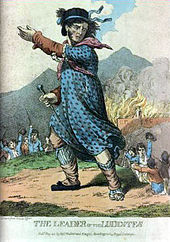- Ned Ludd
-
Ned Ludd or Ned Lud, possibly born Ned Ludlam[1] or Edward Ludlam,[2][3] is the person from whom the Luddites took their name. His actions were the inspiration for the folkloric character of Captain Ludd, also known as King Ludd or General Ludd, who became the Luddites' imagined leader and founder.
It is believed that he came from the village of Anstey, just outside Leicester in England.
The incident that inspired his transformation from 18th-century common man to 19th-century hero of the proletariat occurred when he broke two stocking frames in a fit of rage. This incident is identified as having occurred in 1779, rather than at the time of the Luddites in the 1810s.
Contents
History
Ned Lud was a weaver, believed to be from Anstey, who in 1779, by some accounts, either after being whipped for idleness,[4] or after being taunted by local youths,[5] smashed two knitting frames in what was described as a "fit of passion".[6][7] Other accounts offer the less dramatic explanation that Lud was told by his father, who was a framework-knitter, to "square his needles"; Lud took a hammer and "beat them into a heap".[8] News of the incident spread, and after a time, whenever frames were sabotaged, people would jokingly say that "Ned Ludd did it".[6][7]
By 1812, organized frame-breakers who became known as the Luddites had begun to use the name King Ludd or Captain Dick for their mythical leader.[6]
In popular culture
- Music
- The character of Ned Ludd is commemorated in the folk ballad "General Ludd's Triumph." Chumbawamba recorded a version of this song on their 2003 release, English Rebel Songs 1381–1984.
- Robert Calvert wrote and recorded another song "Ned Ludd," which appeared on his 1985 album Freq; which includes the lyrics:
They said Ned Ludd was an idiot boy
That all he could do was wreck and destroy, and
He turned to his workmates and said: Death to Machines
They tread on our future and they stamp on our dreams.- Steeleye Span's 2006 album Bloody Men has a five-part section on the subject of Ned Ludd.
- The Heaven Shall Burn song "The Final March" has a direct reference to Captain Ludd.
- Alt-country band The Gourds affectionately refer to Ned Ludd as "Uncle Ned" in the song "Luddite Juice" off their 2009 release, Haymaker.[9]
- The Scottish folk musician Alasdair Roberts sings of Ned Ludd in his song "Ned Ludd's Rant (For World Rebarbarised)" on his 2009 album, Spoils.
- Literature
- Edmund Cooper's alternative-history The Cloud Walker is set in a world where the Luddite ethos has given rise to a religious hierarchy which dominates English society and sets carefully prescribed limits on technology. A hammer – the tool supposedly used by Ned Ludd – is a religious symbol, and Ned Ludd is seen as a divine, messianic figure.
- The novel The Monkey Wrench Gang (1975), by Edward Abbey, is dedicated to Ned Ludd.
- Thomas Pynchon wrote an essay entitled "Is it O.K. to be a Luddite?"[10] in 1984, discussing the historical Luddites in the light of the 25th anniversary of C. P. Snow's influential lecture The Two Cultures.
- Anne Finger wrote a collection of short stories titled Call Me Ahab about famous disabled historical and literary figures, which included the story "Our Ned" about Ned Ludd.
- Ecodefense: A Field Guide To Monkeywrenching was published by Ned Ludd Book. Much of the content came from the "Dear Ned Ludd" column in the newsletter of the group Earth First!.
- Stephen King's The Dark Tower contains a metropolis called Lud.
See also
Notes
- ^ Anstey at Welcome to Leicester (visitoruk.com) According to this source, "A half-witted Anstey lad, Ned Ludlam or Ned Ludd, gave his name to the Luddites, who in the 1800s followed his earlier example by smashing machinery in protest against the Industrial Revolution."
- ^ Palmer, Roy (1998) The Sound of History: Songs and Social Comment, Oxford University Press, ISBN 978-0192158901, p. 103
- ^ Chambers, Robert (2004) Book of Days: A Miscellany of Popular Antiquities in Connection with the Calendar, Part 1, Kessinger, ISBN 978-0766183384, p. 357
- ^ Hammond, J.L.; Hammond, Barbara (1919) (pdf), The Skilled Labourer 1760-1832, London: Longmans, Green and co., p. 259, http://www.archive.org/details/skilledlabourer00hammiala
- ^ Chase, Alston (2001) In a Dark Wood, Transaction Publishers, ISBN 978-0765807526, p. 41
- ^ a b c Alsen, Eberhard (2000) New Romanticism: American Fiction, Routledge, ISBN 978-0815335481, p. 43
- ^ a b George Gordon Lord Byron (2002) The Works of Lord Byron. Letters and Journals, Adamant Media Corporation, ISBN 978-1402172250, p. 97
- ^ Traill, Henry Duff & Mann, James Saumarez (1902) Social England, Cassell & Co, p. 841
- ^ Coe, Jonathan. "The Gourds," The Daily Gamecock, January 20, 2009
- ^ Pynchon, Thomas. "Is it O.K. to be a Luddite?" New York Times Book Review, 28 October 1984, pp. 1, 40-41.
Categories:- People of the Industrial Revolution
- English folklore
Wikimedia Foundation. 2010.

